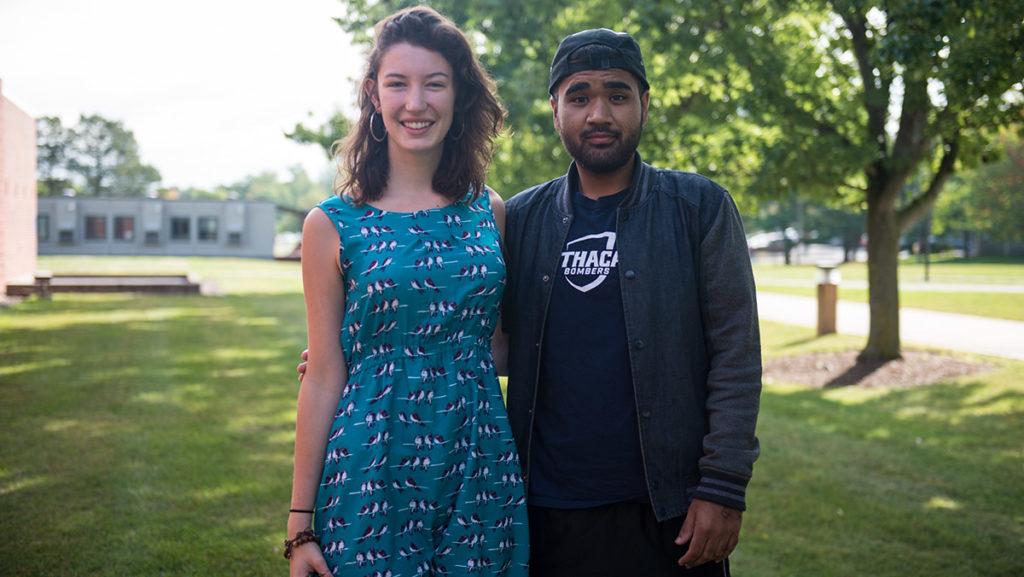Junior Elizabeth Alexander was sitting in a classroom during a video conference organized by a professor, listening to a group of Palestinian university students talk about their lives caught in the Palestinian-Israeli conflict, when she realized how little she knew about their situation.
“It was sort of thrown in my face, and it was an eye-opening moment that left me pretty inspired but also pretty angry,” Alexander said.
This year, Alexander and senior Taranjit Bhatti, along with other students, revived a chapter of Students for Justice in Palestine at Ithaca College, a club that had been created in 2012 but dissolved after its members graduated. The club is a part of a larger organization that consists of over 80 college chapters across the United States and more around the world.
After the Holocaust, the United Nations partitioned Palestine, which at the time was a British colony, into two independent states: one, the Jewish state of Israel, and the other, the independent state of Palestine. Both groups believe they deserve ownership of land that is being disputed, the Gaza Strip and West Bank, which has caused conflicts for decades.
Bhatti and Alexander said they want to start a dialogue about Palestine that they think seems to be absent not only in the campus community but also within course curriculums. They plan to do this by hosting speakers, film viewings and events to bring awareness to the issues happening in Palestine.
Bhatti said now is the perfect time to establish this club, when conversations about race at the college are even more prevalent since the protests of last fall about the lack of emphasis on diversity and inclusion at the college.
“I think the dialogue about race that opened up on campus last year made way for a lot of other dialogues and made space for this discussion to happen,” Bhatti said.
Bhatti said his goal is to introduce the conflict affecting the Palestinian people as a part of the “globalization of systems of oppression,” a term that refers to outside nations exploiting countries in order to profit from them.
“We as students talk about how we’re pro-black or anti-white–supremacy, but we’re not able to see a lot of these other things,” Bhatti said, referring to the conflict.
Students for Justice in Palestine had its own table at the Student Organization Fair on Aug. 31 and had over 60 students and staff and faculty members sign up for the club, Alexander said.
Bhatti said he likes the idea of collaborating or having a discussion with some of the various Jewish-student groups on campus, such as Hillel, a Jewish-student organization, and Student Alliance for Israel, another Jewish student organization dedicated to supporting Israel.
Harriet Malinowitz, a lecturer in the Writing Department and faculty adviser for the club, said she hopes Jewish students will get involved in the conversation. Having an open dialogue between the two groups, Malinowitz said, could lead to greater understanding.
Nalani Haueter, president of the Ithaca College chapter of Hillel, said many members of the group are aware of the strained relationships between Jewish communities and various chapters of Students for Justice in Palestine on other campuses, which has led to a standstill in the dialogue.
Haueter said she believes there is potential for dialogue between the two groups and hopes that the two organizations can discuss their differences.
“We don’t see anger and hostility going anywhere in solving issues,” Haueter said.
Junior Patricia Creamer, also a member of the club, said she thinks activities and talks organized by Students for Justice in Palestine could make room for discussion on Palestine to take place.
“The club could really get the word out and introduce people to some differing ideas and opinions,” Creamer said.
Alexander said she hopes by the end of the academic year, Students for Justice in Palestine will have introduced the Palestinian perspective of the conflict to the campus community.
“We are not here to be Palestine’s voice, but hopefully, we can create a pathway so that Palestine’s voice can be heard,” Alexander said.








